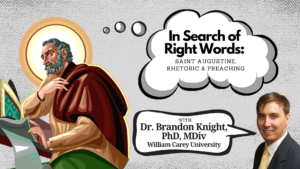 Column Title: In Search of Right Words: Saint Augustine, Rhetoric, and Preaching
Column Title: In Search of Right Words: Saint Augustine, Rhetoric, and Preaching
By Brandon Knight, Ph.D.
William Carey University
Column Description: Saint Augustine, Bishop of Hippo, in his work On Christian Doctrine, illustrates the important relationship between preaching and rhetoric. Even in his day—and still today—many questioned what use the church could possibly gain from the study of oratory. Nevertheless, Augustine saw something much deeper in communication that many Christians still miss centuries later. This column will be a personal journey through Augustine’s On Christian Doctrine, through which he shows how God can, in fact, use rhetoric to help us see more clearly the beauty of Scripture as well as find the right words when articulating gospel truths to others.
December 2021
Prizing Communication in Christian Discipleship: An Introduction to the Column
Augustine. A figure familiar to Americans but, in many ways, completely unknown.
Augustine, a fourth-century African, was born to a pagan father and Christian mother. During his studies, he fell in love with rhetoric, or the study of oratory, only later to be offered a teaching position in Rome. Although he rejected Christianity early on, Augustine found himself many years later as the Bishop of Hippo, a position that required his learning in rhetoric to interpret and teach Scripture to ward off various threatening philosophies like Manicheanism, Donatism, and Pelagianism.
Calvin University professor of philosophy and author James K. A. Smith suggests that contemporary Americans are swimming in an ocean of Augustinian influence as we seek authenticity in a life of busyness and spiritual wandering. Yet, we are unable to realize it.[1]
In short, Augustine’s life is a tale that beckons us to listen even centuries later because of our similar circumstances. Much like today, the Roman Empire was full of both secular and religious enticements that left many Christians unable to communicate the essentialness of their faith. The conversion of Augustine gave the church such a powerful voice that his teachings are still used today.
Rhetorical Fame and Christian Conversion
Augustine’s mother Monica was a Christian; yet, early in his life, Augustine saw no value in Christianity and was even burdened by her prayers and hopes of his own conversion into the faith. After a rise in fame, he rushed off to Rome in hopes of fulfillment beyond the small-world reality of his mother and hometown. Once there, he taught pupils and challenged religious ideas, even persuading others not to follow Christianity. Yet, somehow, he still found himself discontented. He eventually left Rome after receiving a teaching position in Milan.
Something happened to Augustine after leaving Rome for Milan. He met Ambrose, the Bishop of Milan, and heard him speak. His eloquence and style were unique because, to Augustine, the glory of his rhetoric came from the substance of what was being taught. The two could not be separated. How could he have missed this beauty his whole life? He had read parts of the Christian scriptures and found them to be lacking, in his estimation. But now, Ambrose’s articulation of those truths opened up the faith to Augustine.[2]
Soon after meeting Ambrose, Augustine found himself in an internal battle. Would he continue with his own passion and will or give up his desires to Christ? In a cinematic moment, Augustine sat under a tree, meditating about what he should do, and overheard kids playing a game. The phrase they repeated over and over was “pick it up and read it.” Augustine knew this was God speaking to him and rushed to find the first Bible he could. Augustine said the words of scripture gave his heart rest. Later, he converted to Christianity.
Lessons from Augustine for Today
Augustine’s story is the story of American Christianity. We have the Bible, culturally speaking, as a mainstay. Everyone knows what it is. Some would even say that they believe it is the Word of God. However, the lurking question is, do we really believe that the Bible holds invaluable truth? For those who do, how do we find the right words to communicate it to others?
In On Christian Doctrine, Augustine helps laypeople in the church faithfully deal with the interpretation of Scripture and how to communicate Christianity clearly. Why? Because an explanation of the Christian scriptures can persuade or detract others. Through his work, he sought to equip others through hermeneutics (i.e. interpretation) and homiletics (Christian rhetoric). Clear communication of biblical truth is the fruit of what begins in the seeds of hermeneutics.
It is pretty easy to see ourselves in the story of Augustine. Augustine sheds light on how we can communicate biblical truth clearly with Christians and non-Christians in today’s culture of ideological division and incivility, which is something Augustine spent the rest of his life doing as a Bishop fighting for the sake of the Christian faith. We need someone like him to challenge us in our understanding of scripture. Just as importantly, we need someone to challenge us about how we communicate those truths to others.
Augustine and his work reside at the intersection between correctly interpreting scripture and effectively communicating it. The full process of Christian discipleship is one of reading, interpreting, and then communicating those truths clearly to others. We tend to stop at reading and interpreting. Even seminary classes and public figures emphasize interpretation to the neglect of clear communication; but, in On Christian Doctrine, Augustine completes the discipleship process by prizing communication. I hope to do the same in this column.
Notes
[1] James K. Smith (2019). On the road with Saint Augustine: A real-world spirituality for restless hearts. Grand Rapids, MI: Brazos Press.
[2] “And, while I opened my heart to acknowledge how skillfully he spoke, there also came an awareness of how truly he spoke—but only gradually” (Confessions 5.14).
